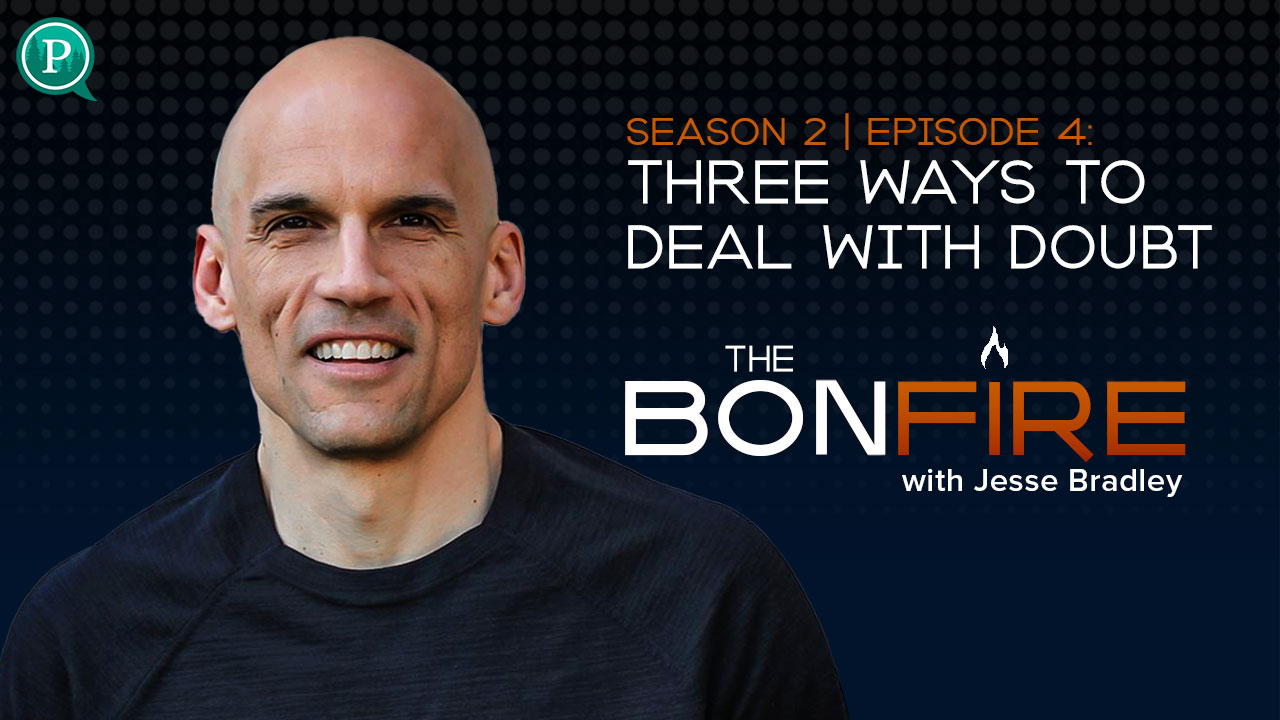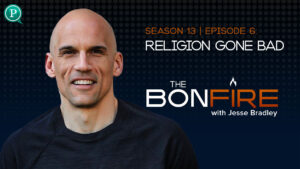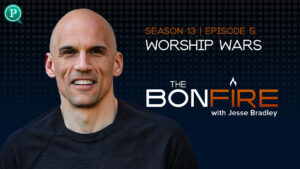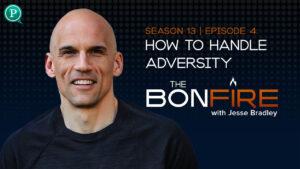Are you in stuck in a cycle of doubt? There are three sources to this doubt. There are three ways to get passed doubt. Join Jesse as we look at the lives of seven people in the Bible and how they overcame doubt.
If this resonates with you, please rate, review, and subscribe where you listen to podcasts. For updates follow me @jessejbradley on all socials and for the latest videos check out my YouTube channel Jesse Bradley. The best is yet to come!
Show Notes:
Trust is the opposite of doubt. There are three sources of doubt. The devil, the world, and ourselves.
Seven. People who overcame doubt in the Bible: Moses, Gideon, Habakkuk, John the Baptist, Nicodemus, a father, Thomas.
Three ways to overcome doubt: repent, research, and receive.
Go directly to God with your doubt, pray, honestly, stay in the community of faith, gain more facts, facts lead to faith.
Share this episode with someone who is doubting.
Special thanks to World Concern for sponsoring The Bonfire Podcast.
Transcription:
Welcome to The Bonfire. Thanks for joining me today. We’re excited as we’re going through season two, looking at specific situations, seven situations that we all face frequently, and how do we walk through those with God. God’s presence is the key. That’s the heart of The Bonfire, to experience God’s presence, to grow in our faith together. There’s no greater gift than God’s presence. Nothing more meaningful, nothing more powerful than the presence of God. And God is love. God is light. God is a consuming fire.
Today we’re going to look at doubts. And we all have doubts at different times, doubtful thoughts, feelings that turn into bigger doubts and situations that create doubt. As we process doubts, this is an overview for today, first we’re going to talk about where doubts come from. There’s three sources. And then look at seven different people in the Bible briefly. How did they work through their doubts? That one’s practical. That look at other people sorting through doubts in an authentic way, I think will inspire us, move us forward with some of the doubts that we face. And then we’ll wrap up with three takeaways, three things that you can do, three things that I can do whenever we have those doubts that want to take over or we start to harbor doubts, and we want to return to God.
At the core of every relationship is trust. The opposite of the doubting is the trusting. And that question, is God trustworthy, is his word trustworthy, will we trust God when it doesn’t make sense, when it doesn’t feel good, will we trust God when it looks like everyone else is going the other direction? Those are the moments of doubt. And trust is what overcomes doubt. Trust at the core of every relationship, it can grow and it can decrease and it’s good to take inventory as we start. How much are you trusting God? Why do you trust God or why do you not trust God? Trust is key. The more we trust, the deeper we go in relationships.
With God, doubts creep in. There’s three ways they come in. First, the devil wants to bring in doubt. And yes, there’s a real devil, real demons. The Bible is very clear. These are fallen angels. The devil’s native language is lies. Lies are linked to doubts because lies create doubts. And the devil comes alongside of Adam and Eve right at the beginning of the Bible. And the question is, did God really say? The question is designed to bring doubts. There’s really an attack, like a dart, a lie, a questioning, an undermining. And the devil is always going to undermine scripture, wants to pull you away from God.. One lie in your mind can create all kinds of doubts in your soul.
It’s important in your mind to reject the lies. Recognize, reject. And then the power of the second thought, replace it with God’s truth. God is always on the side of truth, always on the side of love. Love and truth. That’s the intersection. And as the devil brings in the question did God really say, Adam and Eve stumble. So don’t listen to the devil. Resist the devil. And false teaching. You’ve got to recognize it, and then come back to scripture. The devil’s at work. This is a battle between good and evil, light and darkness. The devil’s one source, demons are one source of lies that lead to doubt.
Here’s the second one. The second one is the world. The world can cause you to stumble. The world has patterns. Don’t conform to those patterns. When those patterns don’t match up with heaven, they don’t match up with God’s priorities, God’s plan, God’s purpose. Even when someone tries to force you to do something that’s immoral or against scripture, this world will not always applaud God in what he’s doing. And there’ll be a lot of people with unbelief. There’ll be a lot of people with doubts, and sometimes doubts are contagious. There’s conversations, and I’ll tell you, there’s a lot of people who want to deceive and pull you away from God. Just the culture does it. There’s a rhythm to the culture. Chase after you right now, whatever makes you feel good. And as you do that, doubts can creep in. When you choose sin, doubts creep in. And this world is loaded with lies and patterns. And sometimes you’re going to need to be counter-cultural and swim upstream, even though the current is running the other direction.
The last place and source of the doubts. There’s the devil and the demonic. Then there’s the world and the culture. And lastly, there’s ourselves. Internally, we doubt. We’re human. We just wonder, is it really this good? Is God really speaking the truth? Can I really bank on his promises? And it’s just our own minds, our own fallen human nature that we don’t trust. And that’s a reality. And that’s another source. Those three sources, it’s important to recognize where doubts come from.
Now let’s take a look at the Bible and seven people that had doubts and how they work through them. Each situation’s different, but very relatable. And the first one’s Moses. And as God calls Moses, Moses has doubts that then lead to excuses. And he forms the doubts with questions. Like, “What if the people don’t believe me?” And then God will reassure him. “Well, what if?” What if? That’s a start to a question that a lot of times there’s doubts, fears, timidity, worry underneath that question. What if? What if? It’s not coming from a place of trust and faith and confidence in God. It’s coming from a place of doubting. Notice the questions and the actions, the words that come out of your mouth that come from a place of doubting.
Now, God appeared to Moses in the burning bush and the bush kept burning. Moses had 40 years of trying to do it his way, 40 years of saying no way to God. And now God was recommissioning him and he had doubts. He wanted to know exactly how it would play out. He wanted to know that certain scenarios wouldn’t take place. He wanted to know exactly what God would do if it went this way. And God reassured him. So Moses works through those doubts and says yes to God. But I’ll tell you, God gets a little angry because the doubts keep going. And Moses says, “Well, just, what if you send someone else?” And God wasn’t having that. And so yes, God provided Aaron, but ultimately it went beyond the questions and it was completely in the doubt zone. When there’s a stubborn doubt, even though God has made something clear and God has reassured, that’s not a place you want to be. Moses was there, but then Moses, he pivoted and then he said yes to God and he moved forward and there was deliverance from slavery.
Another person in the Bible working through doubts is Gideon. And Gideon was naturally a little timid, didn’t have courage. God tried to reassure him, “Gideon, you’re a mighty warrior. It’s time to deliver the people.” But Gideon had signs. He wanted to make sure. And it was one sign after another sign. And when you’re reading the account, you think, “Okay, Gideon, that’s enough signs. God’s made it really clear.” And Gideon is someone who thinks, “Give me one more sign.” Can you relate? Are you like that? “God, just show me one more clear time. Just tell me one more time.” How many times does God need to tell us? And for Gideon, it was a step of faith. He did act in courage. After his excuses, “God, you know my family. We’re the least, I’m the least of my family.” He had all these reasons to doubt.
Doubt doesn’t just float. You’re going to try to attach reasons. This is why I doubt. It’s because of my family. It’s because of how I view myself. It’s because of my past failure. It’s because of what other people said about me. It’s because of… And you’re going to start to line up doubts and connect them with reasons. But the reasoning was not solid. And God gently guided Gideon forward. God will come to you with gentleness and tenderness, reassurance. And Gideon delivers. There’s great victories. And this is what’s interesting. For Gideon, who’s timid, God gives him courage. God takes this army and he says, “No, too many people.” And he brings the number down. And then God says again, “Too many people,” and he brings the number down. This is Gideon, who already wrestles with doubt. Now his army, the number, it shrunk twice.
And what is God doing? God is testing Gideon. God is developing Gideon. God is helping him grow and move past his doubts. God will do the same with you. He will come alongside and he will set something up so that you need to trust him. And it might be a testing. Maybe you’re going through a testing right now. Will you still trust God even though the math doesn’t make sense to you, the results aren’t clear yet? Will you still trust God if you don’t have what you want yet? That’s the time where doubts creep in.
Here’s a third person. This is in the Old Testament. Habakkuk. You can read, a short book in the Bible. It’s a conversation. Habakkuk is open, deep, honest with God. Things don’t add up. He’s asking God, “Why is it that people who reject God seem to be victorious or flourishing in different ways? How can they be mean and seem to get away with it?” He’s got honest questions with God. He’s just doubting God’s control, justice, how God is leading the world. And he’s bringing it all to God, which is so commendable.
When you have doubts, you’re not going to surprise God. You can bring them to God and listen to God, have a conversation with God. What does God say in his word? What does God say when you pray and listen to him? The same in Psalm 73. There was the questioning of how come there’s people who make terrible decisions and they seem to be so successful? Why is it? And it didn’t make sense until, this was a turning point, entering into the sanctuary, worshiping God, thanking God, drawing near to God, and then God renews the mind. God reveals his perspective. And then God shares. There’s a final, not just a right now, but there’s a final where God is going to step in and sort everything out, make it right. It might not be right right away, but long-term it will be. So check out the book of Habakkuk, Psalm 73. You’re going to watch people in the Bible work through their doubt, and that’s important. Don’t tap out. Don’t check out. Don’t drift from God. Instead, work through that doubt.
Now, let’s go to the New Testament and a couple others that really stand out. We have John the Baptist, who is so faithful, so unselfish, the forerunner for Jesus. He declares, “Jesus must increase and I must decrease.” He’s courageous and he calls out the culture to repent. People are getting baptized. When you look at John’s life, it’s incredibly inspiring, devoted. God has his attention, and there’s so many changed lives, and yet John is going to suffer. And when Christ comes back, John’s life starts to fade because now Christ comes on the scene. John starts to dissipate and John’s thrown into prison.
With this mistreatment, John starts to doubt, and it’s very understandable. If God has blessed you in immeasurable ways, and then the end of your story starts to change and you think, “Wait, I’ve been faithful. We’ve seen God move mountains. And now what’s happening?” And in prison, John sends messengers to talk to Jesus and just clarify is this really the Messiah? Is this really the one that was prophesied about? And the answer is yes. Jesus reassures him and repeats the miracles that he’s done, and then also he affirms John the Baptist. “No one greater born of women.” And here’s Jesus communicating to John. “Yes, here’s the facts, John, and also, John, I still love you. God thinks so highly of you, John.” We need that when we’re going through doubts, that God still cares, he still pursues. He still brings truth and reassures, reconfirms. And then he speaks highly of us.
And that’s what helps John move forward. John’s still going to be killed, his head on a platter, literally. It’s brutal. But he stays faithful and he works through those doubts that creep in. Doubts can come at unexpected times. You can have a run of faithfulness and then all of a sudden you start to doubt. What are you going to do with the doubt? Are you going to embrace it, harbor it, or are you going to bring it into the light? Are you going to bring it to God? And that’s what John the Baptist does. He goes to Jesus. Go to Jesus with your doubts.
For generations, children and families in the poorest places in the world have struggled to find clean water, food, and a chance for a brighter future. But all that can change in this generation. You can be part of the solution. Go to worldconcern.org. As you participate, this is what will happen. Villages will be transformed far beyond where the road ends and children and families will receive the love of Christ. You can make a difference. Go to worldconcern.org. Let’s be part of the solution together.
Now, there’s another person in the New Testament and he has some unbelief. His son needs healing. And Jesus is there. Jesus is capable to heal. Jesus has the authority to heal. Jesus is going to heal. But the man has unbelief. And this is his prayer. “Jesus, I believe, but help my unbelief.” What a powerful prayer. He’s acknowledging that he does believe Jesus, he wants to believe Jesus, and at the same time, there’s part of him that’s struggling to fully believe Jesus. And he lays it out, he owns it, and he asks God to help him with his unbelief. Have you ever prayed that prayer to God? “God, please help me with my doubt. God help me with my unbelief. You know I believe, but to be honest, I’m not fully trusting you. There’s something here. I just don’t know, Jesus. Help me, Jesus, because I want to get there. I want to trust you.” And Jesus does heal, and Jesus blesses. This man grows in his faith. Jesus answers that prayer. You can come to Jesus that honest.
How do you talk with God? What does it look like? Do you just ask God to bless everything? Or do you also open up the parts of your life that are not going so well? Do you talk to God about your sin? Do you talk to God about your impure thoughts? Do you talk to God about your questioning, your uncertainty, your fears, your worries? Do you talk to God about your sadness, your grief? Do you let him in? This is a maturing relationship with God when you can be transparent and vulnerable and let God into those places. That’s important. It’s really important.
Now, also in the New Testament, there’s other examples where doubting happens. And one of those, I’m calling it doubting, but really we don’t know the full picture. It’s Nicodemus. And Nicodemus comes to Jesus at night. This is John 3. Nicodemus is established. He’s a religious leader. He’s moral, he’s respected, he has a position, he has prestige, and yet why is he coming to Jesus at night? He’s trying to figure this out. The people that he runs with, his peers, the people that he’s friends with, his religious community, they’re rejecting Jesus, they’re threatened by Jesus. They call the shots. Who is this Jesus coming on the scene?
Nicodemus comes at night, kind of sneaky, Nic at night coming down to talk to Jesus. Why? Because I think he’s wrestling. He’s trying to figure out should I follow Jesus or should I just stick with my tradition? Should I stick with dead religion, or should I go with the Messiah who’s here right now? Jesus is going to share with him that you must be born again. It’s not enough to be religious. You can’t achieve or earn your way to heaven. It’s a gift. It’s received. And he shares John 3:16 with Nicodemus. “For God so loved the world that he gave his one and only son, whoever believes in him will not perish but have eternal life.”
The gospel can crush doubts. The gospel, Jesus died for our sins and he’s risen. There’s power in the gospel. When you share the gospel, when you lift up Jesus, he draws people to himself. And Nicodemus is going to hear it clearly, he’s going to hear it lovingly, that yes, there’s something far greater than the religious system that Nicodemus has been walking in his entire life. There’s living water for his soul. And Nicodemus, I think, comes to faith, puts his trust in Jesus, and that takes a lot of courage. If you’re in a community where they reject Jesus and they’re going to reject you to some degree if you follow Jesus, then that’s a bold step to say yes to the Lord. But ultimately, facts lead to faith, and Jesus keeps sharing more facts. And the more you have the word of God, the more your faith grows. Faith comes by hearing the word of God.
Let me tell you this. If you have a habit of getting into God’s word every day, that’s going to protect you from a lot of doubts and that continual, consistent spending time, memorize, meditate, read, think about, study God’s word. God’s word is powerful. It’s living and active. The gospel’s powerful. It counteracts doubt, and it provides the answers we’re looking for. And Nicodemus receives those answers.
Here’s one last person in the Bible. And the seventh story is Thomas. Thomas has doubts. Thomas has been a faithful follower of Jesus, sincere, devoted, courageous. And yet after the resurrection, Jesus appears to many of the followers and many of the disciples. He ultimately appears to more than 500, a lot of convincing evidence. And yet Thomas is going to be stubborn and hold on to his unbelief. And he takes the posture that unless I see Jesus, how can I really know? If you were there, you would want to say, “Come on, Thomas. Jesus told us he’s going to overcome the grave. He did. The tomb is empty. He’s appeared to us. We’ve seen him. Trust Jesus. Trust us.” You’d want to say that to Thomas. And yet Thomas, again, is so relatable because how many times have we known the scripture and yet practically denied Jesus during the day? Or we know what the right thing to do is, and we choose the thing that we know is not right. It’s easy to go backwards in your faith. Thomas, right now, is stuck and he’s kind of stubborn.
Jesus appears to him, and Thomas is able to touch Jesus. I mean, beyond a shadow of a doubt, the risen Lord appears to Thomas. And here’s where I commend Thomas. He stayed in the community of faith. That’s so important. When you have doubts, stay in the community of faith. Some people have doubts and they drift and they go into isolation, and they’re no longer around people who are believing God, trusting with God, abiding with Jesus, walking with Jesus. And when you step out of the community of faith, you’re more vulnerable. The Bible says when you don’t have a home church, when you don’t have that community, Paul says it’s like being handed over to Satan, trying to just make it on your own, go on your own, do it in isolation. Isolation can be the devil’s playground. Thomas doesn’t choose isolation. Thomas stays in the community of faith.
If you have doubts, keep those friendships with people who love God. You just stay in that and Jesus is going to show up. Pursue Jesus, be open to the truth, and like Thomas, Jesus appears and it makes all the difference. Jesus will continue to reveal himself to you. So don’t give up. Don’t tap out. Don’t check out of the community of faith. Remember Thomas. He stays there. God rewards him. Keep moving by faith. Keep seeking, keep praying, keep worshiping, keep thanking God, even when you hit a patch or a season where the doubt starts to creep in.
I want to share three things I think that are very practical, takeaways, as it relates to doubt. The first thing that we can do is repent. Repent means to turn, turn 180 degrees and really come home, return to God. Repent. If we have not been trusting God, we repent and we decide that we’re going to rely on him, he’s dependable, he’s trustworthy. That’s the repentance. It’s not just an action on the outside. It’s a deep core repentance where you change your view of God, you change how you respond to God, and because he’s trustworthy, his character, I’m going to trust him. And then trusting him looks like… And then you fill in the blank. What does it look like to trust God?
When we’re not trusting God, that’s sin. If we know the good that God wants us to do and we don’t do it, that’s sin. That’s what James says. Sin is missing the mark, commission or omission. It’s the things we know we do wrong, but it’s also the things that we don’t do that are right. All of that sin, we want to turn from sin. Now, there’s some doubt that’s just, it’s pure sin. I mean, God says it’s this way and we doubt it, and we do the exact opposite thing. That’s rebellion. There’s some doubt that’s just rebellion. And we want to repent from that kind of doubt.
Now, here’s the second type of doubt and a second response. The second response is research. I remember when I was just starting to hear about Jesus for the first time. I didn’t grow up in a church, I didn’t grow up reading the Bible, and I had questions. You can have honest, sincere questions. And I didn’t believe yet, but I wanted to know, is the Bible reliable? I wanted to know how many copies are there? How reliable are those copies? I dove into those topics kicking the tires. For me, it was at that point before I started to follow Jesus.
But for other people, it’s later on. Some people grow up in a Christian home and they follow the Lord early. They make a real decision. They’re born again. And it’s not until their twenties that they start to think through, “Wait a minute, can I trust the Bible? How do we know it’s God’s word?” So it comes at different points in terms of research. And the beautiful thing is we have so many resources and there’s so much evidence. God has provided historical evidence. God has given us websites. God has given us books. And God says love him with all your mind. And if you have some topics that you really want to know, bolstering your faith, it’s called apologetics, defending the faith, there are great podcasts, resources, and you can check those out.
Research can lead to a deeper faith. And that initial doubt can become catalytic, a springboard, and you can move forward with more information. And that information, those facts, bolster your faith. Faith is based on facts, not feelings. You can have doubtful feelings. Come back to the facts. Jesus, the facts support him, but our feelings go up and down. And because our feelings go up and down, sometimes our faith starts to waver. Come back to the facts, come back to the research. So the first type of doubt is flat out rebellion. It’s sinful. We repent. The second type of doubt, questions pop into our mind. We’re not sure yet, and we research.
Here’s the third one. And with this doubt, it’s receive. And the doubting I’m talking about is really in the heart. Am I lovable? Could God still care about me even though I’ve rebelled? With the worst sins that I’ve done, does Jesus kind of see me as second rate? Is his love really that good, that immense? And there might be a point in your journey where you start to build up walls. Maybe it’s based on trauma. You’ve been hurt. There’s been pain. Disappointment. Could be your parents, could be a friend, could be someone in a church. And with that loss, with that disappointment, you build up walls and ultimately your receiver for love is blocked. And you don’t really, you’re not comfortable in your own skin. You don’t really love yourself. Like when the Bible says love your neighbor as yourself, you don’t really at peace with yourself and how God made you. You’re not really receiving love from other people like you could, and you’re not really receiving love from God, and it all leads to some more doubt.
So there’s hurt that leads to walls. Your receiver isn’t really receiving. There’s some trauma. Now because you’re not receiving, you’re not really feeling loved. You’re not really viewing yourself how God views you. You have a different, kind of distorted view of God and not receiving his love. And all this is just building up more doubt. We all face trials. Trauma is no joke. The pain and recovery can last so many years. I’m not trying to say that healing is instant. I’m simply encouraging you that with your pain, don’t go into the mode of blocking God’s love, or hating yourself, or not really connecting with other people deeply and letting them into your life, because God’s going to bring his love. He’s going to do it directly with you. He’s going to also bring his love through other people. And he’s made you wonderfully. You’re made in his image.
It’s time to make some shifts. And the receiver in your life, you’re not going to earn God’s love by doing 20 jumping jacks and then reading 20 chapters and then praying for 20 hours. There’s not like a formula. There’s not a do this 1, 2, 3, and God will love you. It’s your receiver. It’s receiving, not striving and achieving. And a lot of people are doubting because they’re not receiving, and the Bible says know and rely on the love God has for us. And part of growing with God is learning to receive that love that’s so wide and so high and so rich and deep and amazing. In his love, nothing can separate you from his love. God doesn’t run out of love. God is love, and perfect love drives out fear. Perfect love is going to drive out doubt. And receiving his love makes all the difference.
So think through those three responses for you today. Have you identified your doubt? That’s where it starts. Doubt from the devil, doubt from the world, doubt from internally, yourself. And then as you recognize the doubts you have, look at these seven people in the Bible and how they work through their doubts. And as you do that, make some decisions. First decision. You can repent from rejecting God and his word, and you can choose to trust God. Second, you can research. Maybe you have some questions, and you can dive deeper. Dig deeper in the faith. Find those books and websites. Get the answers. Love God with all your mind. Facts bolster faith. And then the third one, receive love from God. Receive his love. I don’t know why we’re so slow, cold, to receive the love of God, but we need to receive it. And the more you know you’re loved, doubts start to fade.
There’s a response to doubt. At The Bonfire, we love to talk about stories in the Bible. We love to talk about our lives and grow closer to God. More of God’s presence. That’s what we want. That’s what we’re hungry for. The embers come together with a bonfire. The flame grows. God wants to stir and fan that flame so that it’s blazing. And we need more light in a dark world. And that comes from God. God is love. God is light. God is a consuming fire. So that’s our heart with the podcast.
If this has been helpful for you, please share it with other people. If you know someone that’s working through doubts, then share this episode. And again, this is a place where we can get honest with each other, sometimes talk about some topics that we might not talk about that often with family and friends. But let’s go there together. If you have topics you want us to cover, let us know, thebonfire.org. Love to hear from you, your story, and how God is using this podcast in your life. Tell some friends about thebonfire.org. Rate and review. We appreciate that so much. That helps us to spread hope and the message, the good news of God’s presence. We’ll see you next time at The Bonfire.
Follow this podcast:








